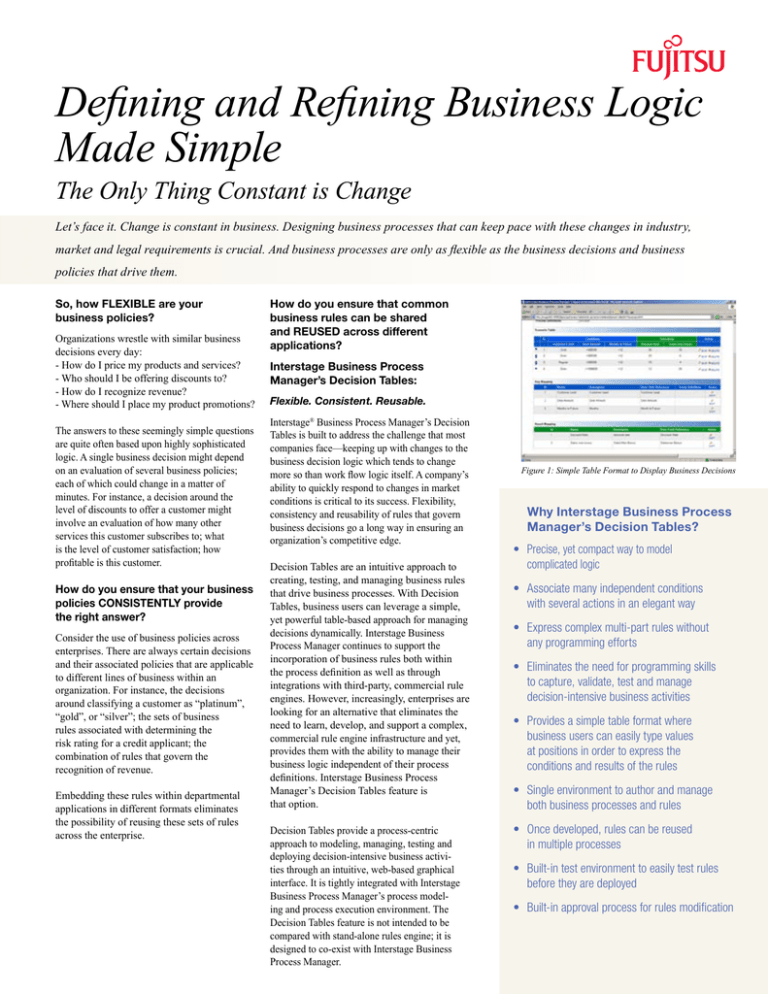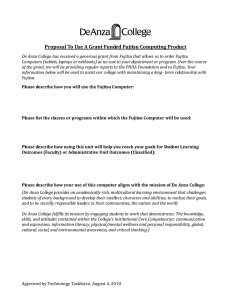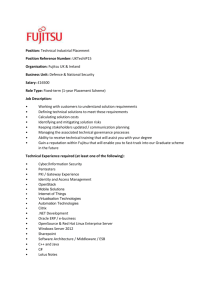
Defining and Refining Business Logic
Made Simple
The Only Thing Constant is Change
Let’s face it. Change is constant in business. Designing business processes that can keep pace with these changes in industry,
market and legal requirements is crucial. And business processes are only as flexible as the business decisions and business
policies that drive them.
So, how FLEXIBLE are your
business policies?
Organizations wrestle with similar business
decisions every day:
- How do I price my products and services?
- Who should I be offering discounts to?
- How do I recognize revenue?
- Where should I place my product promotions?
The answers to these seemingly simple questions
are quite often based upon highly sophisticated
logic. A single business decision might depend
on an evaluation of several business policies;
each of which could change in a matter of
minutes. For instance, a decision around the
level of discounts to offer a customer might
involve an evaluation of how many other
services this customer subscribes to; what
is the level of customer satisfaction; how
profitable is this customer.
How do you ensure that your business
policies CONSISTENTLY provide
the right answer?
Consider the use of business policies across
enterprises. There are always certain decisions
and their associated policies that are applicable
to different lines of business within an
organization. For instance, the decisions
around classifying a customer as “platinum”,
“gold”, or “silver”; the sets of business
rules associated with determining the
risk rating for a credit applicant; the
combination of rules that govern the
recognition of revenue.
Embedding these rules within departmental
applications in different formats eliminates
the possibility of reusing these sets of rules
across the enterprise.
How do you ensure that common
business rules can be shared
and REUSED across different
applications?
Interstage Business Process
Manager’s Decision Tables:
Flexible. Consistent. Reusable.
Interstage® Business Process Manager’s Decision
Tables is built to address the challenge that most
companies face—keeping up with changes to the
business decision logic which tends to change
more so than work flow logic itself. A company’s
ability to quickly respond to changes in market
conditions is critical to its success. Flexibility,
consistency and reusability of rules that govern
business decisions go a long way in ensuring an
organization’s competitive edge.
Decision Tables are an intuitive approach to
creating, testing, and managing business rules
that drive business processes. With Decision
Tables, business users can leverage a simple,
yet powerful table-based approach for managing
decisions dynamically. Interstage Business
Process Manager continues to support the
incorporation of business rules both within
the process definition as well as through
integrations with third-party, commercial rule
engines. However, increasingly, enterprises are
looking for an alternative that eliminates the
need to learn, develop, and support a complex,
commercial rule engine infrastructure and yet,
provides them with the ability to manage their
business logic independent of their process
definitions. Interstage Business Process
Manager’s Decision Tables feature is
that option.
Decision Tables provide a process-centric
approach to modeling, managing, testing and
deploying decision-intensive business activities through an intuitive, web-based graphical
interface. It is tightly integrated with Interstage
Business Process Manager’s process modeling and process execution environment. The
Decision Tables feature is not intended to be
compared with stand-alone rules engine; it is
designed to co-exist with Interstage Business
Process Manager.
Figure 1: Simple Table Format to Display Business Decisions
Why Interstage Business Process
Manager’s Decision Tables?
• Precise, yet compact way to model
complicated logic
• Associate many independent conditions
with several actions in an elegant way
• Express complex multi-part rules without
any programming efforts
• Eliminates the need for programming skills
to capture, validate, test and manage
decision-intensive business activities
• Provides a simple table format where
business users can easily type values
at positions in order to express the
conditions and results of the rules
• Single environment to author and manage
both business processes and rules
• Once developed, rules can be reused
in multiple processes
• Built-in test environment to easily test rules
before they are deployed
• Built-in approval process for rules modification
Interstage Business Process Manager Decision Tables
Key Capabilities
•
Process-centric, dynamic business rules
• Tightly
integrated with BPM
• Web-based, table-like
interface
•
Customizable user interface
•
Built-in rules testing feature
•
Composite conditions support
• Allows
E nsures rapid deployment of flexible,
consistent and reusable business rules
•
Makes it easy for business users to
manage business policies
•
Helps easily incorporate the corporate
look-and-feel
•
Ensures that all business rules get tested
and verified before they are deployed
•
Represent complex business logic
concisely
Detailed audit trail
• Aids
•
ata cleansing and mapping of condition
D
columns and selection columns to
process variables
•
•
Rule life-cycle management using BPM
for flexible business decisions
•
•
•
Fujitsu Computer Systems Corporation
Benefits
compliance and reporting
L ets users easily associate IT-centric
process variable names with more
familiar, business descriptors in policies
Facilitates a consistent process for
modeling and testing business
rules before they are deployed
Where Business Process Meets Rules
The Decision Tables feature helps business users develop and manage process-centric rules. Once the decision tables
are created, they can be integrated into the business process as follows:
Process Instance
Integration Points
Data
Input
Process
Verify
Eligibility
Role Resolution
Who should
this task
be sent to?
Data Validations
Is the data
valid?
Routing Decision
Based on the
data, what is the
next step?
Access Control
Is this person
allowed access?
UNITED STATES
Fujitsu Computer Systems Corporation
1250 East Arques Avenue
Sunnyvale, CA 94085, U.S.A.
Tel: (408) 746-6300
Fax: (408) 746-6360
Toll-free: (888) 248-9273
E-Mail: info@interstage.com
www. fujitsu. com/interstage
EUROPE
Fujitsu Computer Systems Corporation
FEL: Fujitsu Europe Limited
Enterprise Software Division
Hayes Park Central, Hayes End Road,
Hayes UB4 8FE
Tel: +44 (0) 208 606 4902
E-mail: es_support@uk.fujitsu.com
SALES OFFICES
Australia +61-2-9776-4555
Brazil +55-11-3265-0880
China +86-21-6279-7410
Germany +49 (0) 89-3237-8456
Hong Kong +852-2827-5780
Japan +81 (0) 3-6252-2605
Korea +82-2-3787-6000
Malaysia +603-8318-3700,
New Zealand +64-4-495-0700
Philippines +63-2-812-4001
Singapore +65-6777-6577
Spain +34-91-784-9000
Taiwan +886-2-2311-2255
Thailand +66-2-512-6066
United Kingdom +44 (0) 870-234-5555
Vietnam +84-4-831-3895
Enterprise Sales:
1.800.831.3183
us.fujitsu.com/computers
Interstage BPM
Decision Tables
Consumer Sales (24/7):
1.800.FUJITSU
www.shopfujitsu.com
Fujitsu the Fujitsu logo and Interstage are registered
trademarks of Fujitsu Limited in the United States and
other countries. All other trademarks mentioned herein
are the property of their respective owners. Product description data represents Fujitsu design objectives and
is provided for comparative purposes; actual results
may vary based on a variety of factors. Specifications
are subject to change without notice.
©2007 Fujitsu Computer Systems Corporation.
All rights reserved. FPC58-1575-02 2/07.
07.0078.
Figure 3: Process-to-Decision Table Integration Points.
Interstage Business Process Manager is the BPM solution of choice for a wide range of businesses striving to become
more agile in challenging economic environments. With the Decision Tables capabilities in Interstage Business Process
Manager, business users now have a simple way to define, refine, test, and manage the rules that govern their
business processes with minimal IT support.



